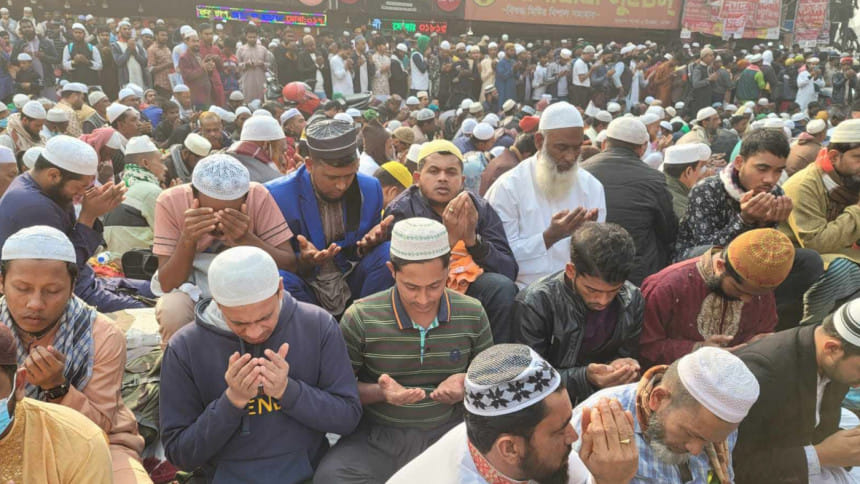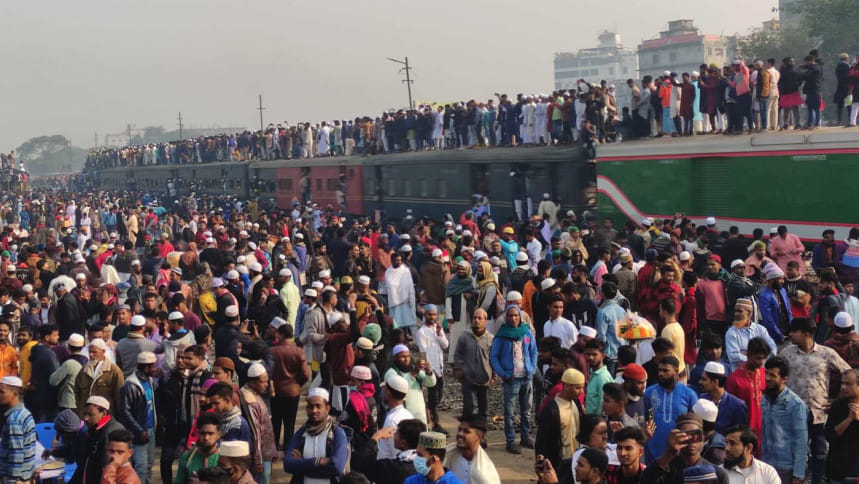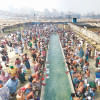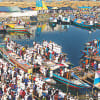First phase of Ijtema ends with ‘Akheri Munajat’

The first phase of the 57th Bishwa Ijtema, the second largest congregation of Muslims, ended today through "Akheri Munajat" (final prayers).
Maulana Hafez Zobair Ahmad, leader of Bangladesh Tabligh Jamaat and head imam of Kakrail Jame Masjid in Dhaka, conducted the munajat on the last day of the three-day ijtema.
Thousands of devotees sought mercy from Almighty Allah by raising their hands for divine forgiveness, blessings for peace and prosperity of the Muslim ummah. They also prayed for the country's welfare.
After the Fajr prayer, Pakistani Tabligh leader Ziaul Huq delivered the sermon, which was translated into Bangla by Bangladeshi Maulana Nurul Rahman.

As part of the rationalised traffic system centring the final prayer, movement of vehicles remains suspended from Tongi-Kamarpara road on Dhaka-Mymensingh Highway — from Tongi to Bhogra Bypass in Gazipur and from Abdullahpur to Ashulia Bypile — from Saturday midnight.
Gazipur Metropolitan Police Commissioner Mahbub Alam told media that the restriction will end at 2:00pm or extend following the final prayer as it will depend on circumstances.
He said vehicles heading to Mymensingh and Gazipur have been advised to use Konabari via Gabtoli while vehicles heading to Dhaka from Mymensingh have been advised to use the 300 Feet Road through Bhogra bypass. During this time, no goods carrying vehicles will be allowed to run on these roads. However, all types of traffic movement related to Ijtema will remain normal.
On the other hand, Bangladesh Railway has decided to run 17 special trains on the occasion of Bishwa Ijtema.
Of these, 14 trains are operating only on the day of Akheri Munajat. Five special trains are running on the Dhaka-Tongi route, five trains on the Tongi-Dhaka route, one on the Tongi-Mymensingh route, one on the Tongi-Tangail route and two trains on the Ishwardi-Tongi-Ishwardi route.
Commencing on Friday after Fajr prayers, this edition of Ijtema kicked off with general sermons by the esteemed Maulana Ahmad Buttullah from Pakistan. The grounds of the Ijtema witnessed the influx of several hundred thousand Muslim worshippers from around the world.
For security, approximately 15,000 law enforcement officials are on duty at the Ijtema grounds and the surrounding vicinity, supplemented by undercover police and intelligence personnel.
The Rapid Action Battalion (Rab) is also present, with watchtowers erected to oversee and ensure the safety of the congregation.
Tabligh Jamaat has been organising the congregation at the venue since 1967. In 2011, it divided Ijtema into two phases to accommodate a large number of attendees.
The second phase of Ijtema will be held from February 9-11 this year.

 For all latest news, follow The Daily Star's Google News channel.
For all latest news, follow The Daily Star's Google News channel. 






Comments